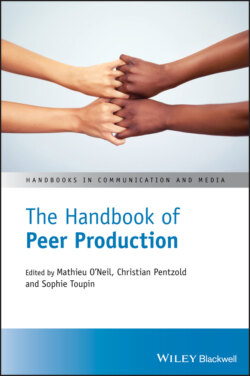Читать книгу The Handbook of Peer Production - Группа авторов - Страница 70
References
Оглавление1 Bauwens, M. (2005). The political economy of peer production. Ctheory Journal. www.ctheory.net/articles.aspx?id=499
2 Bauwens, M. (2009). Class and capital in peer production. Capital & Class, 33(1), 121–141.
3 Bauwens, M., Kostakis, V., & Pazaitis, A. (2019). Peer to peer: The commons manifesto. London: Westminster University Press.
4 Bauwens, M., Kostakis, V., Troncoso, S., & Utratel, A. (2017). Commons transition and peer‐to‐peer: A primer. Amsterdam: Transnational Institute.
5 Bauwens, M., & Onzia, Y. (2017). Commons Transitie Plan voor de Stad Gent. In Opdracht van de Stad Gent. Retrieved from https://tinyurl.com/ybyj5qd4
6 Benkler, Y. (2002). Coase’s penguin, or Linux and the nature of the firm. Yale Law Journal, 112(3), 369–446.
7 Benkler, Y. (2006). The wealth of networks: How social production transforms markets and freedom. New Haven, CT: Yale University Press.
8 Bonaccorsi, A., Giannangeli, S., & Rossi, C. (2006). Entry strategies under competing standards: Hybrid business models in the open source software industry. Management Science, 52(7), 1085–1098.
9 Casilli, A. (2017). Digital labor studies go global: Toward a digital decolonial turn. International Journal of Communication, 11, 3934–3954.
10 Corradetti, C. (2017). Constructivism in cosmopolitan law: Kant’s right to visit. Global Constitutionalism, 6(3), 412–441.
11 Crumley, C. L. (1979). Three locational models: An epistemological assessment for anthropology and archaeology. In M. B. Schiffer (Ed.), Advances in archaeological method and theory (pp. 141–173). New York, NY: Academic Press.
12 Crumley, C. L. (2015). Heterachy. In R. Scott & S. Kosslyn (Eds.), Emerging trends in the social and behavioral sciences (pp. 1–15). New York, NY: Wiley.
13 Dahlander, L., & Magnussonn, M. (2008). How do firms make use of open source communities?. Long Range Planning, 41(6), 629–649.
14 Elliott, M. (2006). Stigmergic collaboration: The evolution of group work. M/C Journal: A Journal of Media and Culture, 9(2). http://journal.media‐culture.org.au/0605/03‐elliott.php
15 Galloway, A. (2004). Protocol: How control exists after decentralization. Cambridge, MA: MIT Press.
16 Giotitsas, C. (2019). Open source agriculture: Grassroots technology in the digital era. Basingstoke: Palgrave Macmillan.
17 Foucault, M. (1977). Discipline and punish: The birth of the prison. New York: Pantheon Books.
18 Freeman, J. (1970). The tyranny of structurelessness. Berkeley Journal of Sociology, 17, 151–165.
19 Kelly, M. (2012). Owning our future: The emerging ownership revolution – journeys to a generative economy. Oakland, CA: Berrett‐Koehler Publishers.
20 Kostakis, V. (2010). Identifying and understanding the problems of Wikipedia’s peer governance. First Monday, 15(3). Retrieved from http://firstmonday.org/htbin/cgiwrap/bin/ojs/index.php/fm/article/view/2613/2479
21 Kostakis, V., & Bauwens, M. (2019). How to create a thriving global commons economy? The Next System Project. Retrieved from https://thenextsystem.org/learn/stories/how‐create‐thriving‐global‐commons‐economy
22 Kostakis, V., Latoufis, K., Liarokapis, M., & Bauwens, M. (2018). The convergence of digital commons with local manufacturing from a degrowth perspective: Two illustrative cases. Journal of Cleaner Production, 197(2), 1684–1693.
23 Marsh, L., & Onof, C. (2007). Stigmergic epistemology, stigmergic cognition. Cognitive Systems Research, 9(1–2), 136–149.
24 Marx, K., & Engels, F. (1848). Manifesto of the communist party. New York, NY: International.
25 O’ Mahony, S., & Bechky, B. (2008). Boundary organizations: Enabling collaboration among unexpected allies. Administrative Science Quarterly, 53(3), 422–459.
26 O’Neil, M. (2010). Shirky and Sanger, or the costs of crowdsourcing. Journal of Science Communication, 9(1). Retrieved from https://jcom.sissa.it/archive/09/01/Jcom0901%282010%29C01/Jcom0901%282010%29C04
27 Ostrom, E. (1990). Governing the commons: The evolution of institutions for collective action. Cambridge: Cambridge University Press.
28 Ramos, J. (2016). Cosmo‐localism and the futures of material production. Retrieved from http://actionforesight.net/cosmo‐localism‐and‐the‐futures‐of‐material‐production/
29 Reagle, J. (2010). Good faith collaboration: The culture of Wikipedia. Cambridge, MA: MIT Press.
30 Reagle, J. (2013). “Free as in sexist?” Free culture and the gender gap. First Monday, 18(1). Retrieved from https://firstmonday.org/article/view/4291/3381
31 Scholz, T. (2012). Digital labor: The Internet as playground and factory. New York, NY: Routledge.
32 Scholz, T., & Schneider, N. (2016). Ours to hack and to own: The rise of platform cooperativism, a new vision for the future of work and a fairer Internet. New York: OR books.
33 Starosielski, N. (2015). The undersea network. London: Duke University Press.
34 Taylor, R. (2010). Kant’s political religion: The transparency of perpetual peace and the highest good. Review of Politics, 72(1), 1–24.
35 van Steen, M., & Tanenbaum, A. (2016). A brief introduction to distributed systems. Computing, 98(10), 967–1009.
36 Wales, J. (2014). Transcript: Jimmy Wales. Aljazeera. Retrieved from https://www.aljazeera.com/programmes/headtohead/2014/04/transcript‐jimmy‐wales‐201446143728879415.html
37 Wark, M. (2004). A hacker manifesto. Cambridge, MA: Harvard University Press.
